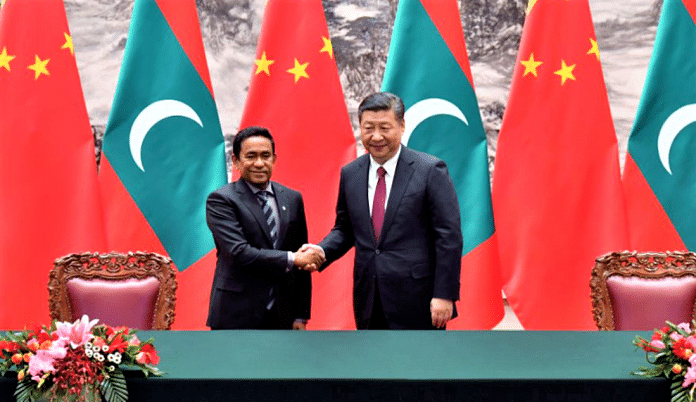India has much homework to do in countering the Chinese influence in the region. Its strategic objectives in containing China need to be better met.
Prime Minister Narendra Modi’s neighbourhood policy has received some rude shocks in recent times — the most conspicuous being the victory of the Left parties in the recent parliamentary elections in Nepal, and the perceptibly strong bonding between Maldivian President Abdulla Yameen and China.
It would indeed be foolhardy to deny that muddled Indian foreign policy had as much to do with both these as extraordinary Chinese guile.
The unrelenting Chinese wooing of the Sri Lankan regime of President Maithripala Sirisena, after its trusted supporter Mahinda Rajapaksa was routed in the elections, is now yielding dividends, with generous Chinese investment in Lankan infrastructure.
The Chinese hold over Pakistan is firm and seemingly unshakeable, and it would assume the shape of a stranglehold with the $46 billion investment China is making in the China- Pakistan Economic Corridor to gain access to the sea through a considerably shorter route, in an effort to control the sea lanes for trade. Craftily, the Chinese are billing Pakistan for the expenditure under a long-term repayment arrangement. Since the road is passing through Pakistan-occupied Kashmir, India needed to protest strongly, but India’s protest has been very low key.
The Modi government had started off with much promise of energising the South Asian Association for Regional Cooperation (SAARC), but the intransigence of Pakistan has soured all hopes of heightened regional connectivity. Clearly, but for the Indian initiative of making and launching satellites on behalf of South Asian countries, there is little of note happening in the grouping. All the promise of a strong regional grouping have evaporated.
Afghanistan and Bangladesh are the only countries in the region with strong bonds with India, but it is undeniable that in the latter, India is wholly dependent on the personal goodwill of Prime Minister Sheikh Hasina Wajed. If she is out of power, there is no knowing which way Indo-Bangla relations will go.
There is indeed a strong case for a governmental re-look at the region to prevent encirclement by hostile forces that are in China’s strategic grip. The ‘string of pearls’ theory of China encircling India with hostile neighbours was deprecated earlier, but now it is being looked at afresh in the light of concrete fresh evidence.
The starting point in any salvage operation for India could well be in the Maldives, where traditional goodwill and co-operation with India is in serious jeopardy thanks to sinister Chinese designs. The muted Indian response—to President Yameen’s declaration of emergency, the repudiation of the Supreme Court’s order to release some lawmakers, and the arrest of former President Maumoon Abdul Gayoom and the country’s chief justice—is indefensible.
Considering that the United Nations has thrown its weight behind opposition moves to restore the rule of law and the US and Britain have called upon the Yameen regime to implement the court’s decision to release nine lawmakers, India has ample reason to pick up the cudgels on behalf of the opposition.
The Mohamed Nasheed regime, the first democratically-elected government in the Maldives, was forced to quit by Yameen. It would be in the fitness of things that free and fair elections be held in the Maldives at the earliest under international supervision, and the majesty of the apex court be restored in the tiny nation of just over 400,000 people, which has the advantage of a strategic location. That would automatically strike at the roots of Chinese influence and Saudi designs in buying an atoll in the cluster of islands.
Any delay by the international community, especially India which has high stakes, would allow Yameen to consolidate and fuel Chinese neo-colonialism in the string of islands. That indeed would potentially frustrate attempts to retain freedom of navigation and unhampered trade for India and countries like the US, UK, Australia and Japan.
In Nepal, it was myopic Indian policy that allowed the Communists to spread the bogey of India’s hegemonic designs and fan fear that it was seeking to bring the landlocked country to its knees through a prolonged blockade on the movement of goods.
India needs to reassure the Nepalis that it has no such designs and that it is committed to Nepal’s sovereignty and well-being. For strategic reasons, Sri Lanka is crucial in India’s scheme of things. India and the US need to work together to ensure that Sri Lanka does not fall prey to Chinese designs in gaining access to the sea.
Just ahead of China’s Belt and Road Initiative (BRI) summit in May 2017, Colombo refused to allow a Chinese submarine to dock. This was an encouraging sign. But in early December, Sri Lanka handed over the strategic port of Hambantota, which is expected to play a key role in China’s BRI, to China on a 99-year lease. The opposition cried foul, but to no avail. Significantly, Sri Lanka is struggling to pay back its existing $8 billion debt to China.
All in all, India has much homework to do in countering the Chinese influence in the region. India’s strategic objectives in containing China need to be better met.
The writer is a senior journalist.




Always surprised to see how Indians try their best to portray CPEC as a scam. Even this article makes it seem like Pakistan is just building infrastructure to be a pass thru for China. Forget that Pakistan is building CPEC for its own economic needs.